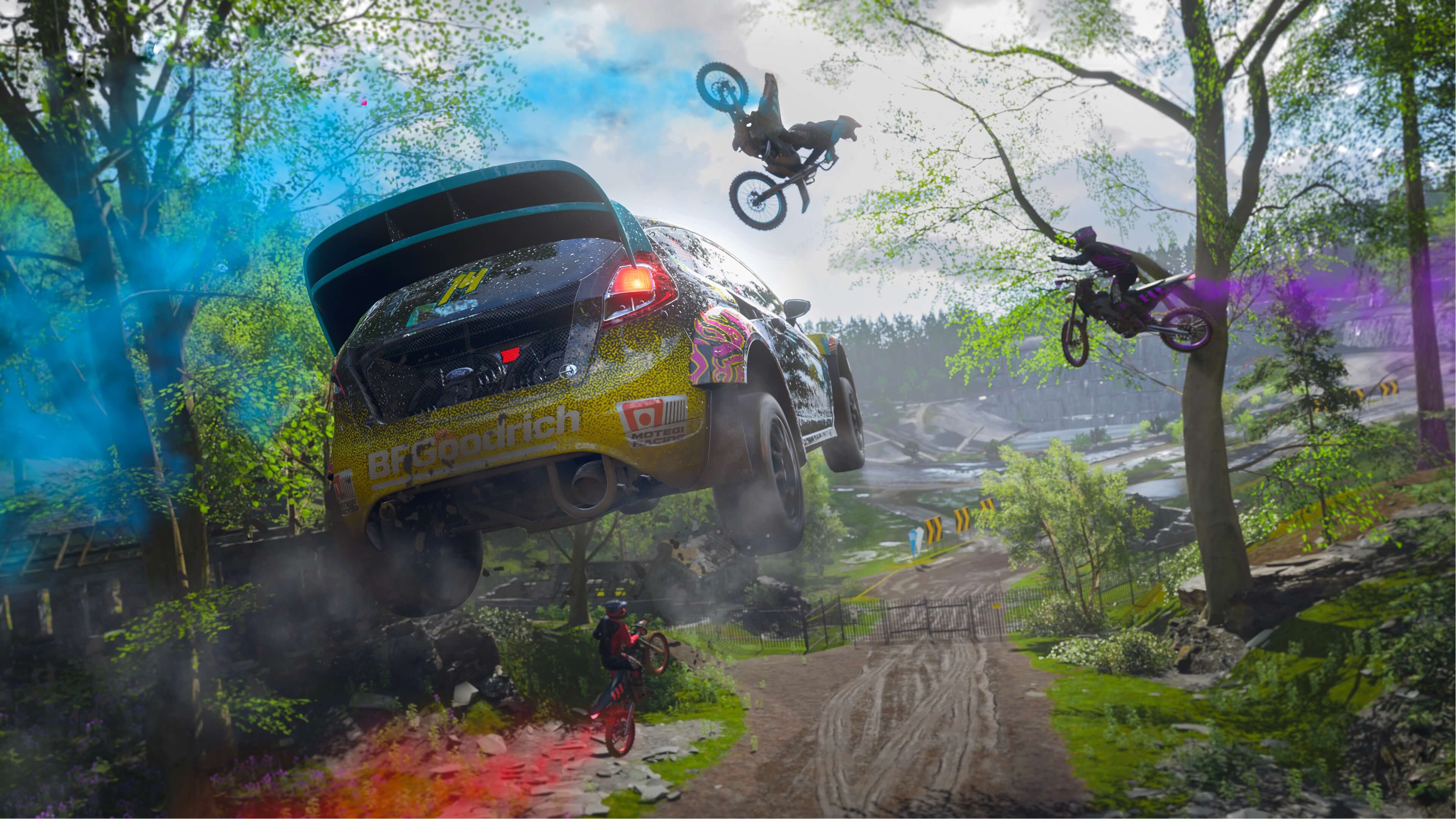Racing title Forza Horizon 4 is arriving to digital store shelves this week worldwide (October 2) and to work out what kind of GPU power you'll need to enjoy it we've tested about 50 graphics cards, so we have a big GPU benchmark incoming.
Forza Horizon 4 is an open world racing video game developed by Playground Games and published by Microsoft Studios. The game features over 450 licensed cars and is set in a fictionalised representation of the United Kingdom. As the name suggests it's the fourth Forza Horizon title, but also the eleventh installment in the Forza series.
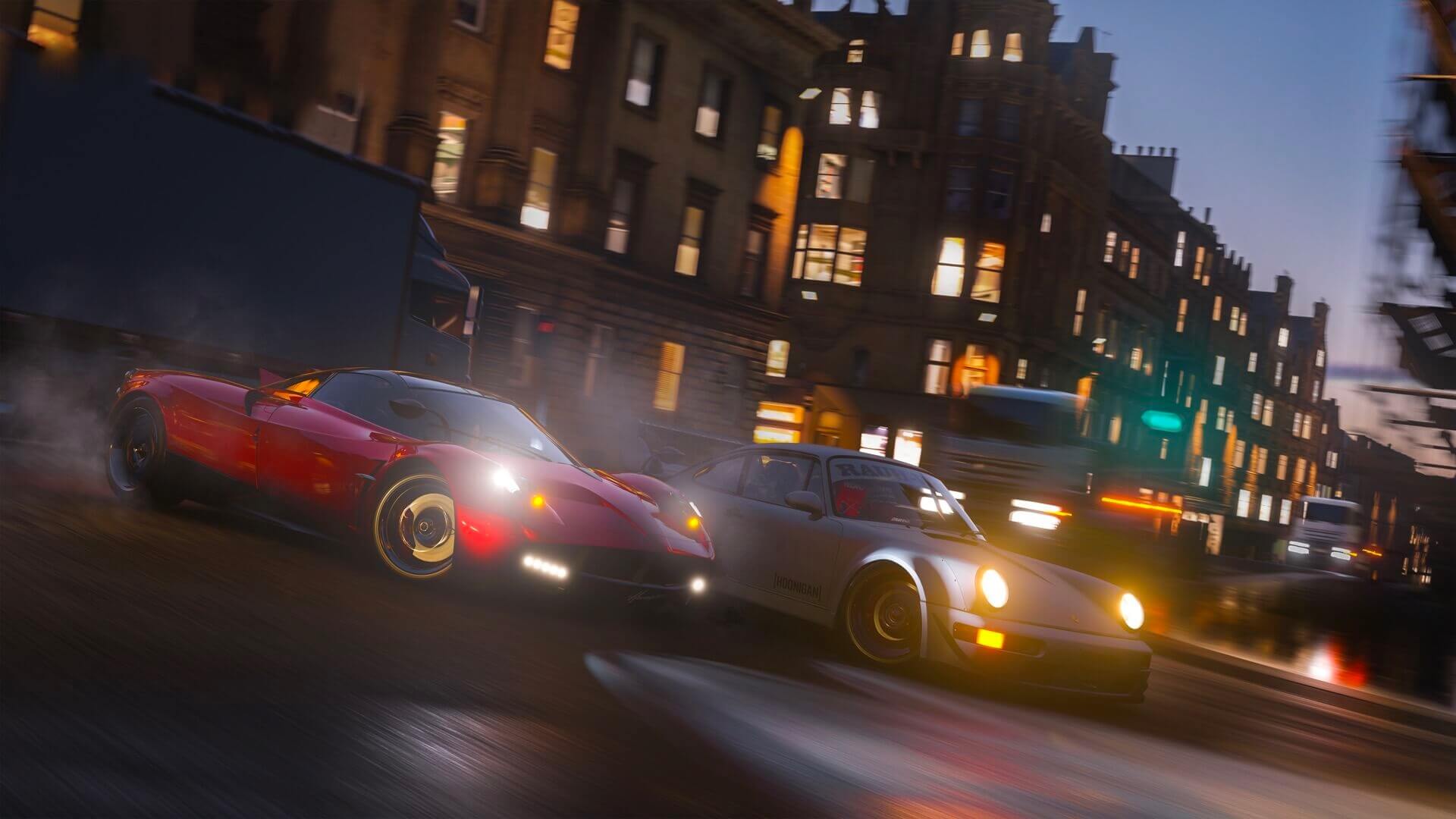
Two years ago we skipped over testing Forza Horizon 3 due to terrible performance on PC, and that wasn't a suitable condition for testing. The situation with Forza Horizon 4 couldn't be more different. The game is very well optimized, especially on modern hardware and to say that it's visually breathtaking would be an understatement.
For testing we used the game's built-in benchmark. Normally we avoid canned benchmarks but the version provided here is very good and does a great job of representing actual gameplay. We used the 'Ultra' quality preset at 1080p, 1440p and 4K resolutions. Then as a bonus we've re-tested some of the current and previous generation mid-range GPUs along with some older models with the medium quality preset at 1080p.
Along with a ton of different graphics cards, our test rig is comprised of a Core i7-8700K clocked at 5 GHz with 32GB of DDR4-3400 memory. For the Radeon GPUs we're using Adrenalin Edition 18.9.3 and for the GeForce GPUs driver version 411.70.

Benchmarks
First up let's take a close look at the 1080p results. Things look pretty normal here, the GTX 980 looks a little lackluster, getting beaten by pretty much all the mid-range AMD offerings such as the R9 Nano and 390.
When looking at the more modern GPUs for 60 fps on average, all gamers require is a GTX 1060 6GB or RX 580, both delivered exceptional performance at 1080p, keeping frame rates above 60 fps at all times.
Something interesting here was how much lower the RX 560 2GB was than the 4GB model, basically delivering RX 550-like performance. The 2GB GTX 1050 was also quite a bit slower than the 3GB model. Then at the bottom of the graph we find the GT 1030 in both the GDDR5 and DDR4 variants. Both performing more badly usual in this title.
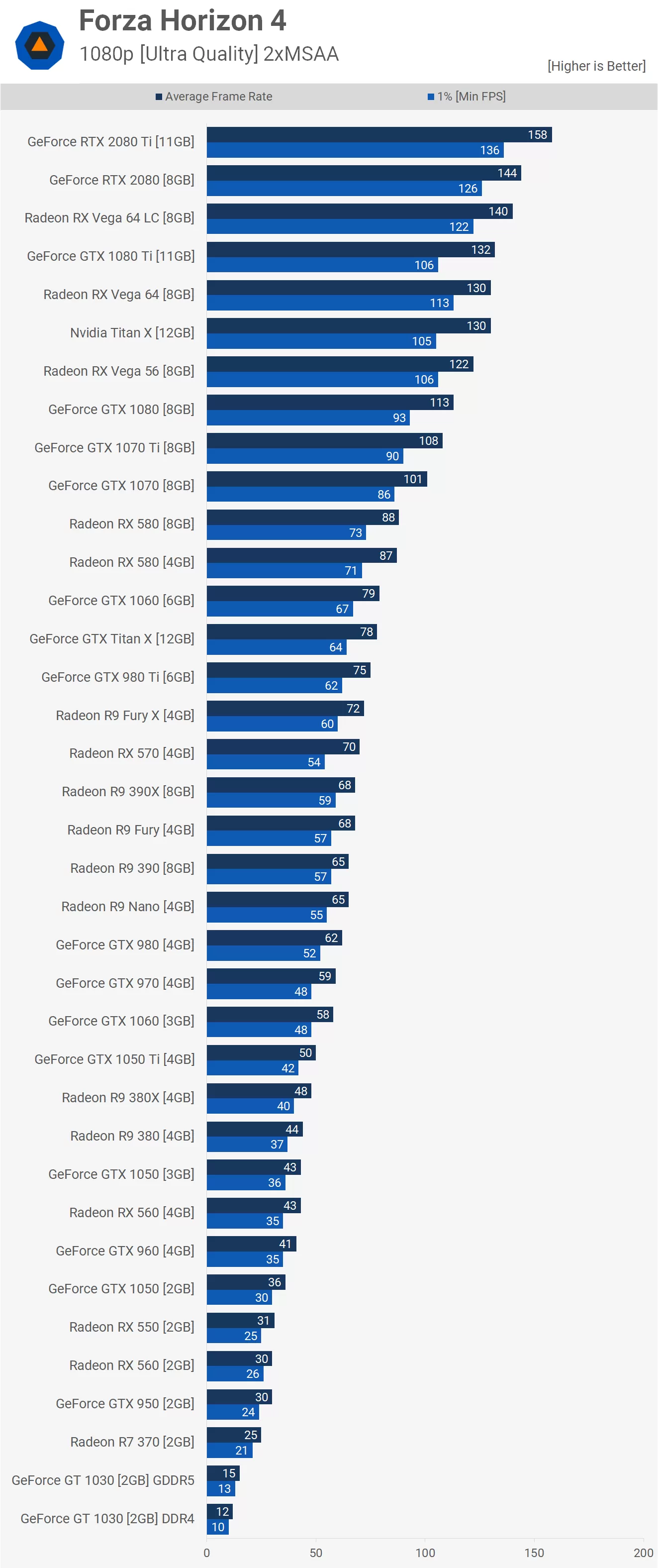
The Fury X comes in just behind the GTX 980 Ti while the R9 380 just beat the GTX 960. For 60 fps on average you'll require the GTX 980 or better but for a minimum of 60 fps you'll require the Fury X or GTX 980 Ti, so that's a tall order at just 1080p.
Something else you've no doubt noticed is how well the AMD GPUs perform in this title, Vega 64 Liquid for example is still matching the RTX 2080, making it noticeably faster than the GTX 1080 Ti. Vega 56 also crushed the GTX 1080 and wasn't much slower than the GTX 1080 Ti. We see this across the board, the RX 570 smashed the 3GB GTX 1060 as another example, offering a massive 21% performance boost.
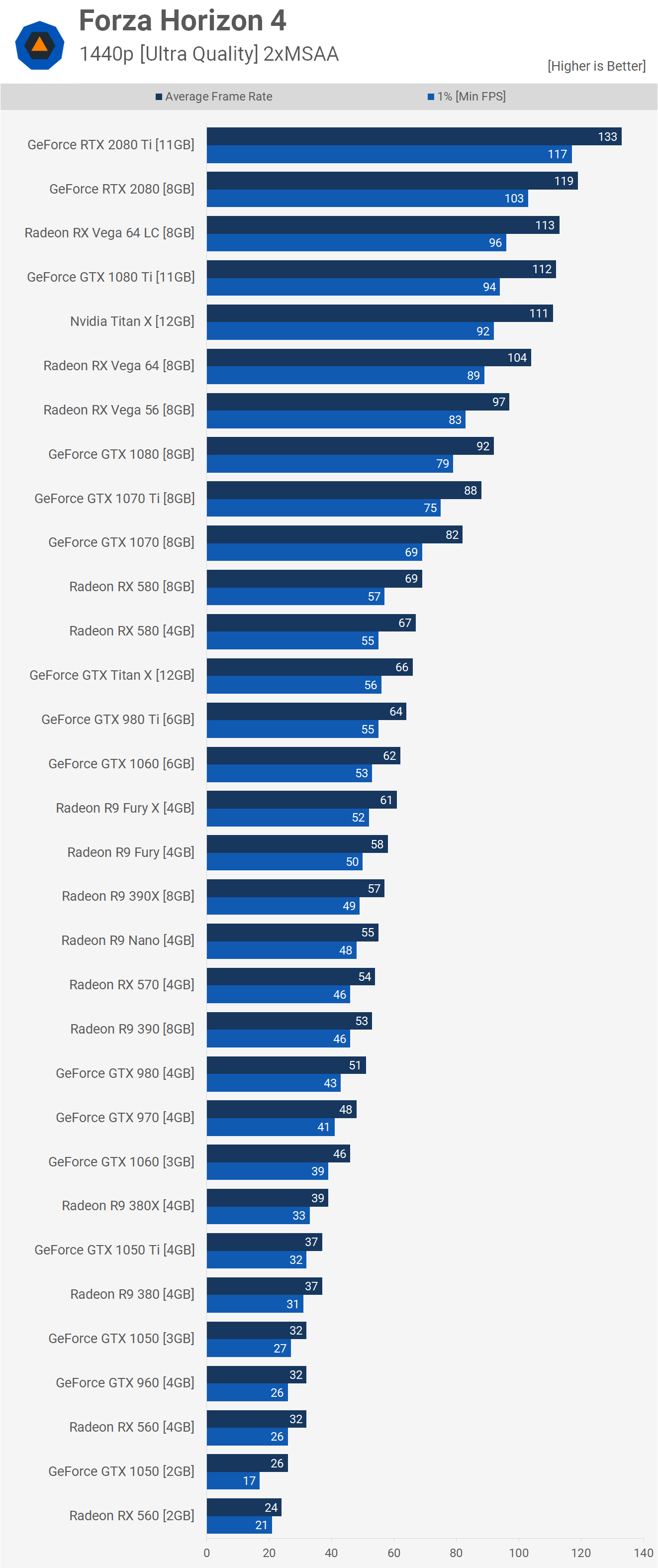
Moving up to 1440p we've dropped a number of the entry level GPUs as they were simply too slow. As you can see the GTX 960 and R9 380 are borderline playable, depending on your standards. Anything slower than the GTX 970 is really struggling here and short of the very fastest previous generation cards you will notice regular slowdowns.
Again we see the graphics cards with only 2GB of VRAM really struggling. For around 60 fps on average the GTX 1060 6GB or RX 580 will again be required, while the GTX 1070, 1070 Ti, 1080 or Vega 56 will be needed in order to keep frame rates above 60fps.
The Radeon GPUs keep schooling the GeForce competition here, especially Vega 56 given it makes sense in terms of price vs. performance. Vega 64 Liquid looks impressive, but truth be told given the price it should always match the GTX 1080 Ti.
Interestingly the 2080 Ti was just 12% faster than the 2080 and less than 20% faster than Vega 64 Liquid and the GTX 1080 Ti. So a pretty weak showing here for the new RTX graphics cards in terms of price vs performance.

As you might have expected 4K performance, at least with the ultra quality settings is off the table for the GTX 980 Ti and Fury X. Overall not great performance from these older generations but I was stunned to find the GTX 1070 delivering over 50 fps on average with a 1% low of 46fps.
AMD's Vega GPUs do fall away a little at the 4K resolution but even so we see Vega 56 matching the GTX 1080, so still an impressive result for the red team. Vega 64 Liquid was able to push over 60 fps at all times and we saw the same from the GTX 1080 Ti, RTX 2080 and, of course, the RTX 2080 Ti. As usual the RTX 2080 Ti was incredible at 4K pushing up to 100 fps on average. Still that meant it was just 20% faster than the GTX

To finish off testing we've tested almost 30 GPUs using the Medium quality preset with MSAA disabled in favor of FXAA. This wasn't a quick exercise, you're looking at around 8 hours of work just to create this graph. The game has to be completely reset when changing quality presets and almost every time it crashes on the reset, but I'll touch on this more in a moment.
Depending on the GPU you're looking at anywhere from a 20 to 40% performance uplift when downgrading from the ultra to the medium quality preset. The RX 570 for example saw a 20% performance boost while the GTX 1050 saw a 30% boost and the RX 550 a 40% boost.
The medium quality preset allowed the GTX 960 and R9 380 to average around 60 fps and enabled playable performance for most of the older mid-range GPUs. Finally the GTX 780 and 780 Ti for whatever reason locked up when loading the benchmark, I tried many workarounds, all failed.
Closing Remarks
We hope that serves you as a guide for those of you wanting to know how well Forza Horizon 4 will run on your PC. Frankly we're super impressed with how well optimized this title is, particularly for modern hardware. The game runs very well on older GPUs, but for the modern stuff the level of optimization is incredible.
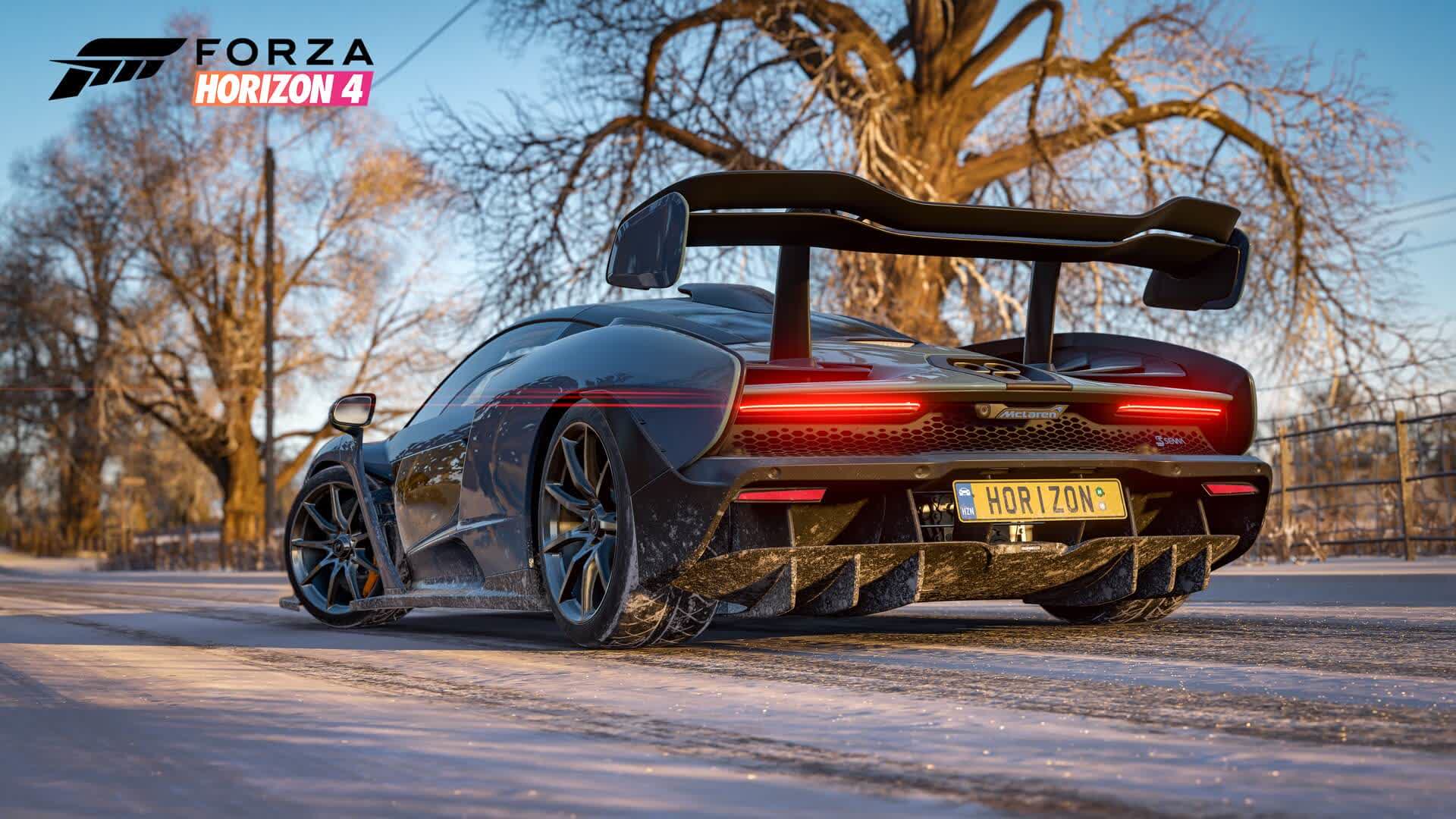
We never expected to find a game that looks this good and is comfortably playable at 4K using a GTX 1070, and we sure as hell never thought we'd see over 60 fps using Vega 56. In fact, Vega 56 was the star of the show, offering GTX 1080 performance or better for less money. If only performance looked like this in all games...
AMD dominated the lower-end battles as well, with the RX 580 and 570 completely cleaning up. It's very interesting that one of the best looking most optimized titles we've ever seen, shows off Radeon GPUs in such a positive light.
We were lucky to be able to play and test the game ahead of release, and while it does look amazing and plays very well, it's not exactly bug free. I only ran into a few in-game crashes when testing, the biggest issue was seen when just trying to get into the game. For me the game crashed way too often when starting up or when changing quality settings.
Expect some early patch to fix this. It was certainly annoying, but thankfully for the most part once you get in, Forza Horizon 4 runs like a dream. You still have to contend with the disgustingly poor Windows Store and the fact that it appears impossible to back up a 60GB game install, but what can you do?
Shopping Shortcuts:
- GeForce RTX 2080 Ti on Amazon, Newegg
- GeForce RTX 2080 on Amazon, Newegg
- AMD Radeon Vega 56 on Amazon, Newegg
- GeForce GTX 1080 Ti on Amazon, Newegg
- GeForce GTX 1080 on Amazon, Newegg
- GeForce GTX 1060 on Amazon, Newegg
- AMD Radeon RX 580 on Amazon
- GeForce GTX 1060 3GB on Amazon, Newegg, Best Buy
- AMD Radeon RX 570 on Amazon
- GeForce GTX 1050 Ti on Amazon, Newegg, Best Buy
